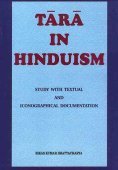Pancamakara, Pañcamakāra, Pancan-makara, Pamcamakara: 9 definitions
Introduction:
Pancamakara means something in Buddhism, Pali, Hinduism, Sanskrit. If you want to know the exact meaning, history, etymology or English translation of this term then check out the descriptions on this page. Add your comment or reference to a book if you want to contribute to this summary article.
Alternative spellings of this word include Panchamakara.
In Hinduism
Shaktism (Shakta philosophy)
Source: Google Books: ManthanabhairavatantramPañcamakāra (पञ्चमकार) [=makārapañcaka?] refers to the “five Makāras”, according to the Manthānabhairavatantra, a vast sprawling work that belongs to a corpus of Tantric texts concerned with the worship of the goddess Kubjikā.—Accordingly, “[...] There is no Dharma or Adharma there and nothing licit or illicit. Liberation is there in the Western (transmission) where the arising of the one letter (AIṂ) takes place. One cannot attain liberation in the Five Makāras (makārapañcaka) by means of other systems. Liberation by means of the five (sacrificial) substances abides in the Western (transmission), the tradition of the Śrīkrama. Liberation is present everywhere in non-duality, that is, where the Lioness faces downwards (as the triangular Yoni)”.

Shakta (शाक्त, śākta) or Shaktism (śāktism) represents a tradition of Hinduism where the Goddess (Devi) is revered and worshipped. Shakta literature includes a range of scriptures, including various Agamas and Tantras, although its roots may be traced back to the Vedas.
In Buddhism
Tibetan Buddhism (Vajrayana or tantric Buddhism)
Source: OSU Press: Cakrasamvara SamadhiPañcamakāra (पञ्चमकार) refers to the “The Five M-words” (of Tantra), referring to: 1) madya, 2) māṃsa, 3) maithuna, 4) matsya and 5) mudrā.—What Kaula and Kāpālika practices had in common was both the offering and consumption of impure substances, by Brahmanical standards, specifically madya, "liquor", māṃsa, "meat", and maithuna, "sexual intercourse", not just the act of engaging in copulation, but the consumption of the resulting dravyam, "fluid", specifically male semen, and its female biological equivalent, menstrual blood, the dissolved egg and uterine lining. It was through the direct consumption of these fluids, that an alchemical result was achieved, the obtainment of jñāna, divine knowledge. The combination of the male and female sexual fluids was called amṛitam, "nectar", which comes from the root word amṛita, which means "immortal", indicating that consuming the two life giving substances combined, was believed to result in the obtainment of immortality. Two more substances were added, matsya, "fish", and mudrā, "parched grains", to form the Pañcamakāra, "The Five M-words" of Tantra.

Tibetan Buddhism includes schools such as Nyingma, Kadampa, Kagyu and Gelug. Their primary canon of literature is divided in two broad categories: The Kangyur, which consists of Buddha’s words, and the Tengyur, which includes commentaries from various sources. Esotericism and tantra techniques (vajrayāna) are collected indepently.
Languages of India and abroad
Sanskrit dictionary
Source: DDSA: The practical Sanskrit-English dictionaryPañcamakāra (पञ्चमकार).—the five essentials of the left-hand Tantra ritual of which the first letter is म (ma); see पञ्चतत्त्व (pañcatattva) (2).
Derivable forms: pañcamakāram (पञ्चमकारम्).
Pañcamakāra is a Sanskrit compound consisting of the terms pañcan and makāra (मकार).
Source: Cologne Digital Sanskrit Dictionaries: Shabda-Sagara Sanskrit-English DictionaryPañcamakāra (पञ्चमकार).—n.
(-raṃ) The five essentials of the left hand Tantra ritual; “Madya” wine, “Mansa” flesh, “Matsya” fish, “Maithuna” copulation, “Mudra” gesticulation. E. pañca, and makāra the letter M; all beginning with that letter.
Source: Cologne Digital Sanskrit Dictionaries: Monier-Williams Sanskrit-English DictionaryPañcamakāra (पञ्चमकार):—[=pañca-ma-kāra] [from pañca] n. the 5 essentials of the left-hand Tantra ritual (the words for which begin with the letter m, viz. madya, wine; māṃsa, meat; matsya, fish; mudrā, intertwining of the fingers; and maithuna, sexual union), [Horace H. Wilson] (cf. -tattva and, [Religious Thought and Life in India 192]).
Source: Cologne Digital Sanskrit Dictionaries: Yates Sanskrit-English DictionaryPañcamakāra (पञ्चमकार):—[pañca-makāra] (raṃ) 1. n. Five essentials of the left hand Tantra ritual.
[Sanskrit to German]
Sanskrit, also spelled संस्कृतम् (saṃskṛtam), is an ancient language of India commonly seen as the grandmother of the Indo-European language family (even English!). Closely allied with Prakrit and Pali, Sanskrit is more exhaustive in both grammar and terms and has the most extensive collection of literature in the world, greatly surpassing its sister-languages Greek and Latin.
Kannada-English dictionary
Source: Alar: Kannada-English corpusPaṃcamakāra (ಪಂಚಮಕಾರ):—[noun] (pl.) the five practices some Śaiva cults profess eating of fish and flesh, liquor, particular countenances for meditation, and sexual intercourse (all of which in Saṃskřta starts with the letter 'ಮ').
Kannada is a Dravidian language (as opposed to the Indo-European language family) mainly spoken in the southwestern region of India.
See also (Relevant definitions)
Partial matches: Makara, Pancama, Kara, Panca.
Starts with: Pancamakarashodhanavidhi.
Full-text: Pancatattva, Makarapancaka, Makara, Pancama.
Relevant text
Search found 4 books and stories containing Pancamakara, Pañcamakāra, Pancan-makara, Pañcan-makāra, Pancama-kara, Pañcama-kāra, Panca-makara, Pañca-makāra, Pamcamakara, Paṃcamakāra, Pancamakāra, Panca-makāra; (plurals include: Pancamakaras, Pañcamakāras, makaras, makāras, karas, kāras, Pamcamakaras, Paṃcamakāras, Pancamakāras). You can also click to the full overview containing English textual excerpts. Below are direct links for the most relevant articles:
Chaitanya Bhagavata (by Bhumipati Dāsa)
Verse 2.8.120 < [Chapter 8 - The Manifestation of Opulences]
Verse 2.24.89 < [Chapter 24 - The Lord Displays His Universal Form to Advaita]
Verse 3.2.270 < [Chapter 2 - Description of the Lord’s Travel Through Bhuvaneśvara and Other Placesto Jagannātha Purī]
Cidgaganacandrika (study) (by S. Mahalakshmi)
Part 1c - Tantric character of Krama < [Krama system and Trika school]
Amarakoshodghatana of Kshirasvamin (study) (by A. Yamuna Devi)
Religion, Religious Myths and Legends (Introduction) < [Chapter 4 - Cultural Aspects]
Hindu Pluralism (by Elaine M. Fisher)
Ardhanārīśvara Dīkṣita and the Birth of Samayin Śrīvidyā < [Chapter 2 - The Making of the Smārta-Śaiva Community of South India]
Related products

